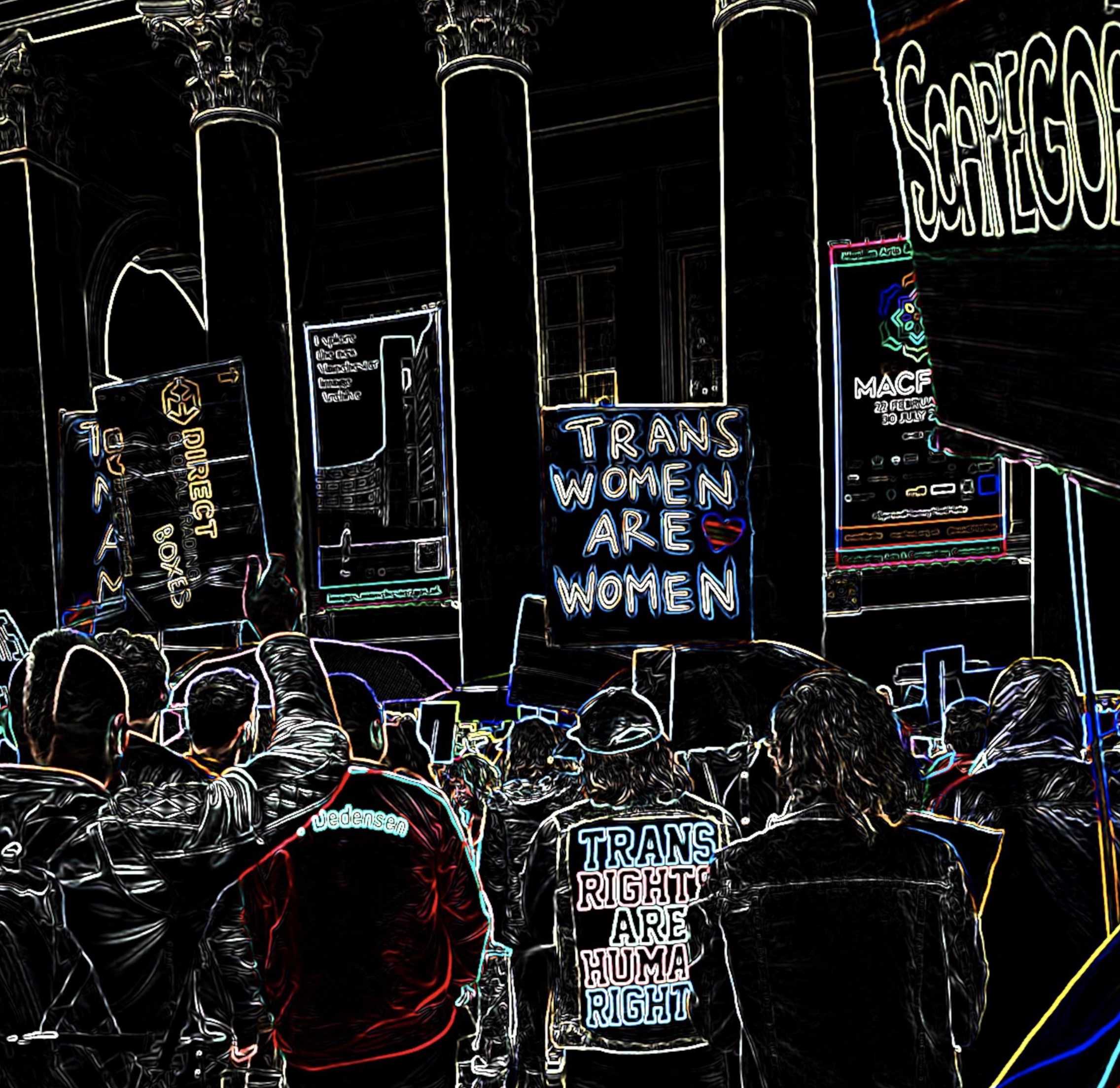Ashley Walker
On 16 April 2025, the UK Supreme Court ruled that under the Equality Act 2010, the term sex refers exclusively to sex assigned at birth—misleadingly referred to as “biological sex” in the judgment. This interpretation deliberately excludes trans and non-binary people from sex-based protections enshrined in the Act.
The ruling also promotes an extremely reductive understanding of human biology, ignoring aspects such as the neurological basis of gender identity and the existence of intersex individuals. By reducing sex to a binary concept based solely on chromosomes, the court erases the realities of many people’s lives and experiences.
The case brought asked whether a trans woman holding a Gender Recognition Certificate (GRC) is legally considered a woman and thus entitled to be counted within the 50% female representation quota on a public body. The Scottish Government argued that such trans women are protected under the Equality Act 2010. In contrast, For Women Scotland—an openly anti-trans organisation—argued they are not.
Despite the framing from some politicians and commentators that this was merely a legal clarification, the Supreme Court made an active and impactful choice. Only four interventions were permitted in the case.
Two of these came from anti-trans groups: Sex Matters, and a joint submission by Scottish Lesbians, The Lesbian Project, and the LGB Alliance. These groups put forward the unfounded argument that recognising trans women with GRCs under the definition of ‘woman’ would infringe upon the rights of women, particularly lesbian women.
Another intervention came from the Equality and Human Rights Commission (EHRC), a body tasked with upholding equality and human rights in Britain. While the EHRC reiterated its prior position that a person with a GRC has changed their legal sex and should be recognised as such under the Equality Act, it echoed many of the same concerns raised by the anti-trans groups—claiming, without evidence, that such recognition could harm gay men and lesbian women. The EHRC has faced long-standing criticism from LGBTQ+ organisations for failing to adequately support LGBTQ+ rights, particularly the rights of trans individuals.
Only one of the four interventions—submitted by Amnesty International UK—genuinely defended trans rights, arguing that human rights principles support the Scottish Government’s position.
A further intervention, backed by the Good Law Project and led by two trans legal experts, was rejected by the court without explanation. Yet, the court allowed new evidence from anti-trans groups—evidence that was not subject to scrutiny, as no opposing voices were permitted to challenge it. Had trans people been allowed to intervene, this evidence could have been properly tested.
The Good Law Project [2] explains why this was a deeply flawed and dangerous choice by the Supreme Court. The fact that all five justices were cisgender, and no trans, intersex or non-binary individuals were allowed to contribute, is—in our view—not just exclusionary, but discriminatory.
How to fight this ruling
Legally, only Parliament has the power to overturn this ruling. Joanne Lockwood, writing on Substack [3], outlines several immediate actions the Labour Party could take to support trans, intersex and non-binary people. These include legislative amendments to ensure that sex and gender protections explicitly include these communities.
Given Labour’s overwhelming parliamentary majority—and with likely support from smaller parties and independent left MPs—they have the power to act. However, the political will appears lacking. Keir Starmer and the Labour leadership welcomed the ruling, with Starmer explicitly stating he no longer believes trans women are women [4]. As a result, meaningful action from Labour is extremely unlikely.
The only viable path forward is to build a broad, united movement for LGBTQIA+ rights—anchored in solidarity with wider struggles in the workers movement for working-class rights and justice – an inclusive coalition grounded in collective resistance is essential for pushing back against this regressive tide.
ISL Statement on Supreme Court Ruling
Demonstrations and rallies were organised in London and 24 UK cities by trans rights groups and allies, including trade unions, community organisations, and left-wing parties. Many carried home-made banners declaring for trans rights. Support came from RMT, PCS, UCU, Unison, Unite, Renters Union, FBU and others.
There is a palpable sense of fear and anger. Yet the demonstrations show that trans people are not a “debate” to be had or a “problem” to be erased. They are an integral part of our communities—our friends, comrades, and neighbours.
There is widespread anger that trans people continue to be debated, dissected, and politicised—further marginalised by the erosion of their democratic rights. But trans people have always been here are not going away, and they are not alone.
Trans rights are not separate from the broader struggle for workers’ socialism. Without engaging in this collective struggle, we will never make our democratic rights permanent or build a socialist society.
Shamefully a Morning Star article(Communist Party of Britain and the Young Communist League) back the Supreme Court ruling. Given these organisations’ origins in Stalinism, this is unsurprising—but nonetheless, we condemn these right-wing position.
AN INJURY TO ONE…
The depth of support across the Left, the trade union movement, and community organisations shows that we can—and must—build a dynamic, united front in opposition to both the Supreme Court and Keir Starmer’s government.
This struggle must be taken to the streets. We must build a class-independent, democratic united front—one that respects the autonomy of all militant organisations and is grounded in a working-class programme to defend trans rights and all democratic rights that capitalism is viciously removing.
References
• supremecourt.uk/uploads/uksc_2024_0042_judgment_aea6c48cee.pdf – [1]
• goodlawproject.org/the-supreme-court-ignored-trans-voices-im-ashamed-of-what-our-law-has-become/ – [2]
• substack.com/inbox/post/161808402 – [3]
• www.bbc.co.uk/news/articles/crldey0z00ro – [4]


